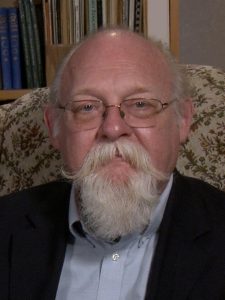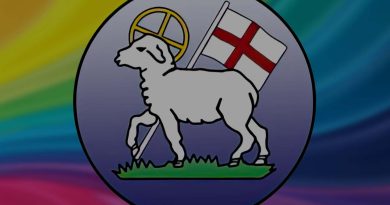A Divisive and Generational Issue
by the Rev. John Jackman
It’s no secret that we live in a very divided world. Sadly, our church reflects the world around it when it should be healing and unifying. I recently took my turn in the great Unity Prayer Watch, and was deeply saddened to see how many provinces had requested prayer to heal divisions. And there is no issue that divides us more than the issue of homosexuality and same-sex marriage.
Why are issues of sexuality so powerful and so divisive? There are many reasons. First, sexuality is a very personal and deeply-felt thing, often wrapped up with powerful feelings of guilt. Second, this attitude was completely intertwined with religious values. I’m afraid the human manifestation of the Church has often been way too obsessed with sexuality, far more than is actually justified by the Bible.
In a world where everything seems to be changing so fast, for a lot of people this is the bright line they cannot get across. Admitting their parents and grandparents might have been wrong about this issue is simply not something they can do. I’ve actually had several people say this to me in so many words. But even more so, it is an attitude wedded to a particular view of the Bible, a view that is woven into every aspect of their understanding and worldview. Questioning this view of the Bible and exploring broader meanings would let go of too much – and perhaps unravel a flood of other things that they might have to rethink, too. This is an approach to the Bible that is widely held by American Evangelicals and has been broadly disseminated by TV preachers, megachurches, and popular writers over the last thirty years. But it is an approach to the Bible that is at odds with the Moravian understanding that has been set forth by our Faith & Order Commission – and expressed in the writings of our great leaders of the past. This is important, because while the Evangelical approach to the Bible can be very reassuring, it is easy to misuse and can become quite toxic. It is the approach that was behind witch hunts, the exclusion of women, acceptance of slavery and other sinful practices, even such things as the persecution of left-handed folks.
But one of the early lessons I learned about being a Moravian was that you don’t have to agree with someone to respect and love them.
I have good friends on both sides of this divide – people I care about and respect deeply. But one of the early lessons I learned about being a Moravian was that you don’t have to agree with someone to respect and love them. As I set about recruiting articles for this publication, I did not do so with the intent of changing minds, or forcing people to choose a side. That is something that does happen, but quite rarely. In 2016 and 2017, I took part in many of our formal conversations about homosexuality and the church. As a table moderator, I participated in many discussions and heard many views. In that experience, I don’t recall any changed minds. Instead, for me, a “success” was when someone said, “I understand what you are saying now – I still don’t agree with you, but I get what you are saying.” So often our discussions on hard issues aren’t discussions at all – they are exercises in responding to we think the other person said rather than understanding what they actually said. No, the goal here is not to change minds – it is to articulate people’s views in such a way that others might say, “I understand what you are saying.” This was something that sometimes happened in Home Moravian Church’s respectful discussion of the issues, which you can read about in the Rev. Ginny Tobiassen’s article about that process.
The issue here for Moravians is not changing minds – it is how do we live together as the people of God when we don’t agree on things? And that in fact has been the core issue of the Unitas Fratrum since 1457. We should be able to worship together as followers of the Great Shepherd in spite of disagreements. Dr. Michael Kinnamon points out in his address Vital and Viable that the Moravian Church is ultimately a profoundly countercultural thing – a “both-and” church in an “either-or” world. It is the unique blessing of Moravians. When we lose this special thing, then why are we here? The Moravian Church is supposed to be a place where a believer in infant baptism can take communion right next to an ardent advocate of believer’s baptism. They may each have completely different understandings of the bread and the wine, but they are Moravians together!
Inside our churches, I hear the cry, “Where are the young people?”
What is also different about this issue is that it is starkly a generational one, as well. When I have attended meetings of a local group opposed to same-sex marriage in the Moravian Church, I am generally the youngest person there – and I’m nearing retirement! When I stand outside the meeting with the folks standing in favor of respecting LGBTQ+ folks, most of the people holding rainbow banners are much younger than me. Inside our churches, I hear the cry, “Where are the young people?” It’s no secret that Gen Y and Gen Z are leaving institutional churches in droves. I talk to a lot of them, and one of the issues that comes up again and again is the issue of attitudes towards LGTBQ+ and same-sex marriage. It’s not the only issue; but it’s the most frequent that I hear. The overwhelming majority of young people do not understand why this is such an issue for their elders; but their bitterness and hurt over the attitudes is causing them to leave organized religion in truckloads. Not an opinion; a fact borne out by numerous studies, including those done by evangelical groups. I recently attended a pastors’ workshop led by Sam Rainer, a Southern Baptist pastor and researcher — and he said bluntly that their studies were showing that the fights over this and similar issues were the major factor driving young people away from the church, leaving them so bitter and hurt that might never come back – becoming one of the “dones.” The prescription? Stop fighting about it!
LEARN MORE: https://www.prri.org/research/generations-at-odds/
Now, I understand where this discomfort with LGBTQ+ comes from among my older brothers and sisters. When they were growing up, this was a subject so taboo that you couldn’t even speak of it. They were taught that it was the sin of Sodom and Gomorra (it wasn’t, the Bible says so1). The pressure of church and society said that it was a perversion, worse than practically anything else. Not everyone had that attitude, there have always been kind people who understood that queer folk were just folk – children of God loved by God. But the overwhelming message of society was to create a level of learned fear and disgust, much the same way they were taught to feel disgust about a mixed marriage or having black folk swim in the same pool. As a result, I have a lot of respect for folks older than me whose faith and wisdom has reached past that social construct to show God’s love to LGBTQ+ folks. I don’t expect them to suddenly become comfortable with the idea of same-sex unions, it took me a long time to get my mind around that.
The educated and comprehensive, grace-filled approach to the Bible that is historically Moravian gets lost.
But the other issue that I mentioned above is the way we understand and use the Bible. American Calvinism has rubbed off a lot on the Moravian Church, especially in the Southern Province2 – and in the last decades, American Evangelicalism has held sway over many in the pews, even if not among the clergy. Bumper-sticker bits of the Bible are used like weapons out of context to “prove” God’s condemnation of anyone different. The educated and comprehensive, grace-filled approach to the Bible that is historically Moravian gets lost; rather than interpreting Scripture through the “lens” of Jesus’ teachings, it’s far easier to listen to the confident pronouncements of a TV preacher. Just like them, we sometimes find it easy to fall into pulling snippets of Scripture out of context and giving them a meaning that fits our preconceptions. And when we’re angry or afraid, when it feels like the world is changing under our feet and no one respects the things we see as important, it’s all too easy to wield those snippets like brickbats, devoid of the love of God that they should contain. As Hampton Morgan’s excellent article reminds us, this is the approach to Scripture that caused us to accept and condone slavery. And as Dr. Worth Green points out, God is still speaking to the Moravian Church, and continues to reveal new truths – and helps us see farther than our ancestors. Progressive Revelation is a real thing! But too often we fall in with society; too often the term “Christian” today conjures up hostile images that more reflect the politics of our time than the compelling love of Christ — or the wisdom of Comenius, or the compassion for the world that Zinzendorf expressed. It is too easy for us to lose our way in our certainty that we are “right.”
To be really blunt about it, this issue will ultimately resolve itself over time. As the older folks die off, and the hemorrhaging American Evangelical church fades, the opinion of the younger folks will prevail. But will the Moravian Church still be there? Or will we cling to this shibboleth so devoutly that we drive away all the young folks, every family with a gay child, so that we are the last generation of Moravians? I think since the pandemic, many are awakening to the realization that this might in fact be the future reality. Who in Winston-Salem would believe that Wachovia Bank is gone? Who in Pennsylvania would believe that Bethlehem Steel no longer exists? But they are gone, and so might be the Moravian Church, Southern Province as we know it.
I think we need to listen with compassion to the young folks and learn from them, and together seek the guidance of the Holy Spirit to find the mission of the Moravian Church in the 21st century. After all, when that famous renewal of 1727 occurred in Herrnhut, Count Zinzendorf was only 27. Leonard Dober was 25 when he went to St Thomas. Peter Boehler was only 26 when he met John Wesley and influenced his conversion. It seems to me that many Moravians today would be the ones turning a deaf ear to their new ideas.
Conversely, I believe very deeply that the Moravian Church has something very special and profound to teach the young people leaving evangelical churches today. But how can they receive that gift if we are so caught up in confrontation that we cannot listen to one another – or listen to Christ?

I hope that this publication will be helpful to Moravians and other Christians as they earnestly seek the will of God in this new time.
The Rev. John Jackman is a Moravian pastor who is also an author and filmmaker. He serves as pastor of Trinity Moravian Church in Winston-Salem, NC.
Featured photo from Dreamstime.
1 Ezekiel 16:49-50 declares, ” This was the guilt of your sister Sodom: she and her daughters had pride, excess of food, and prosperous ease, but did not aid the poor and needy. They were haughty, and did abominable things before me; therefore I removed them when I saw it.” (NRSV)
2Laypersons who are not educated on theological issues and our history might be astonished to learn of the gulf between early Moravians and John Calvin, and Zinzendorf-era Moravians and the “Great Awakening” Christians of Colonial days. The Puritans forbade Christmas; Moravians kept on celebrating it joyfully. Those Moravians taught of an overwhelming love of Christ that would overcome all, while Whitefield and Edwards taught of a fearful God ready to drop sinners into burning fires. We have never “fit in” with the popular religion of fire and brimstone, always focusing instead on Christ and his mercy. Peter Boehler, famed as the Moravian missionary who converted John & Charles Wesley (and later minister in Bethlehem, PA) believed that the love of Christ was so inexorable that it would ultimately save all.




